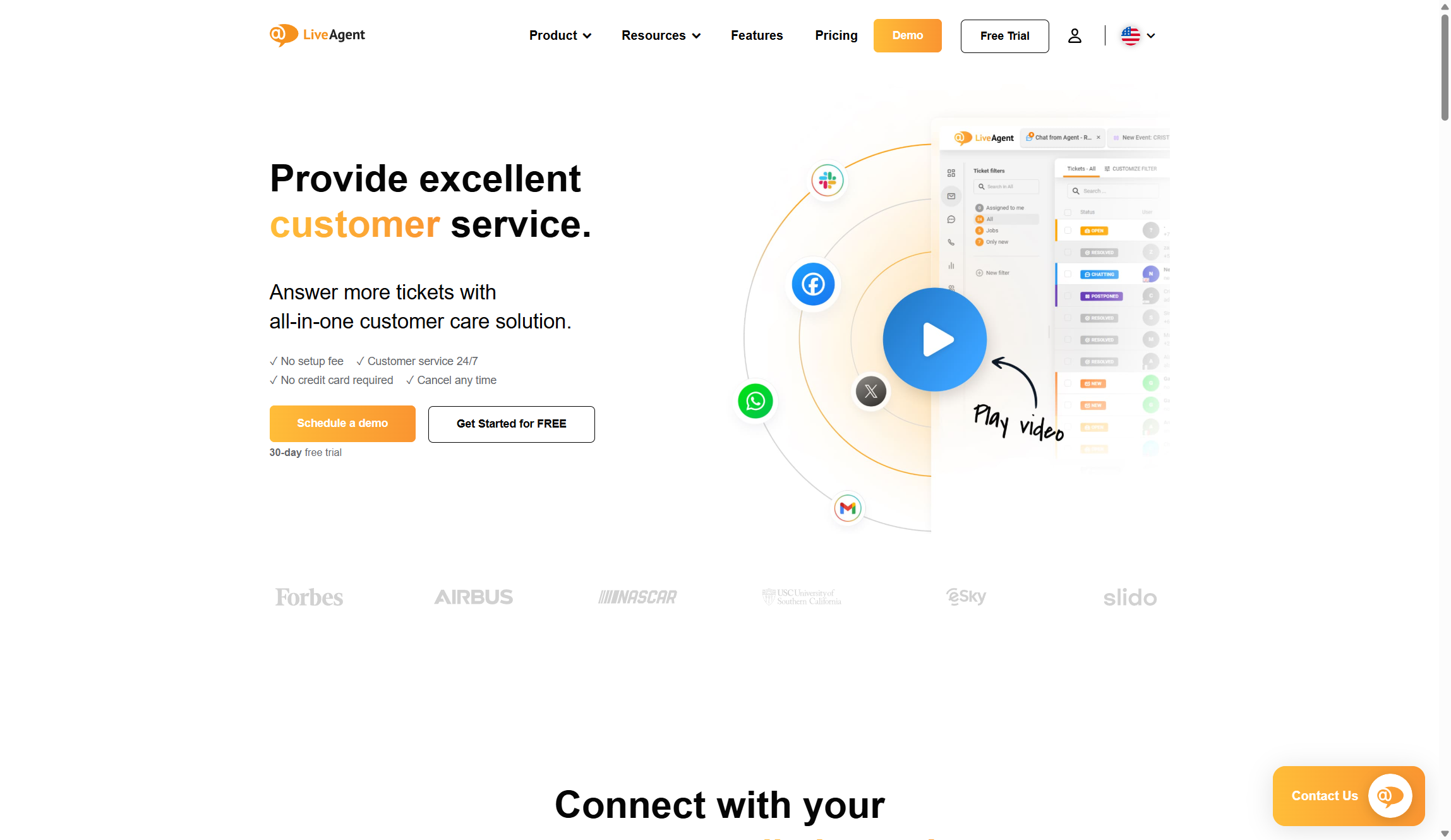TechRadar Verdict
LiveAgent is a reliable helpdesk solution for companies that want to offer phone, email, and live chat support. It’s best if you have numerous support agents since it includes auto-routing and back-end coordination features.
Pros
- +
Omnichannel support capabilities
- +
AI auto-reply tool
- +
Comprehensive ticketing system
Cons
- -
Occasional crashes and loading
- -
Limited AI chatbot capabilities
- -
Network connectivity issues
Why you can trust TechRadar
LiveAgent is a complete customer service platform that combines help desk features with live chat integration. This cloud-based tool offers a unified way to handle customer support — letting businesses manage all interactions from a single dashboard.
LiveAgent simplifies communication across various channels. These include email, live chat, social media, voice calls, and video calls. It turns all customer queries into tickets, regardless of where they come from. This helps support teams track and resolve issues more efficiently. The software also includes features like automated ticket routing, canned responses, and a built-in call center. Together, these tools enhance the speed and quality of customer service.
With tools for faster responses and personalized interactions, LiveAgent has data to prove that it improves customer satisfaction and loyalty. It claims that businesses can see up to a 325% increase in conversion rates within the first month of using LiveAgent. Better customer service leads to higher retention, more positive recommendations, and increased sales.
LiveAgent serves a wide range of businesses, from small startups to large enterprises. But, it's most popular among retail and software companies, with many users in the U.S. and U.K. Thanks to its scalability, it's ideal for growing businesses and for those adapting hybrid work models. Larger organizations also find its features and integrations appealing for complex workflows. Whether you're a small e-commerce store or a multinational company, LiveAgent provides the tools to enhance your customer support.
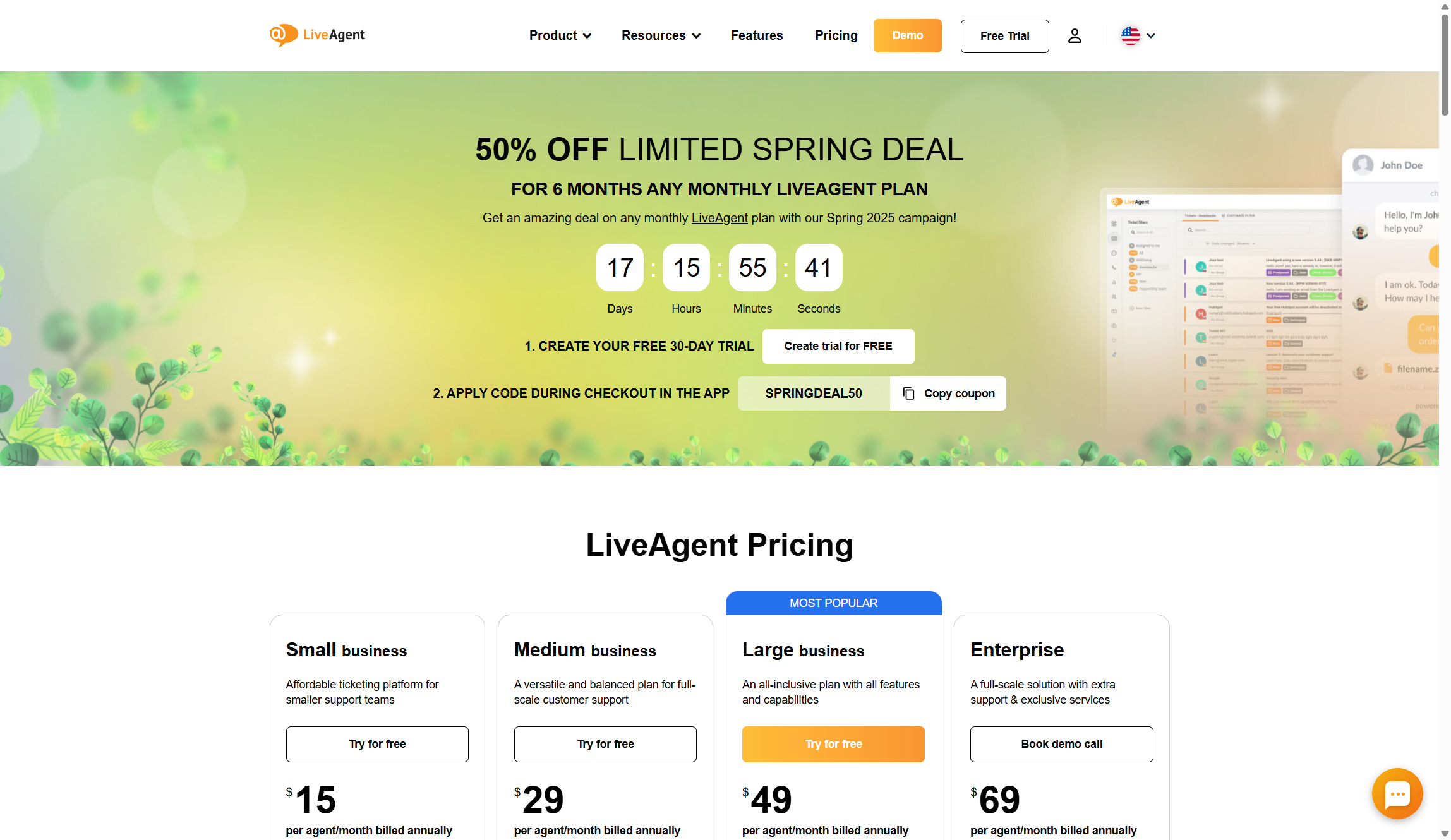
LiveAgent: Plans and pricing
Since our previous review, LiveAgent's Pricing page has had a revamp.
Paid 'Business' plans start at $19 per month per agent if billed monthly or $15 per agent if you're paying annually. The lowest tier 'Small' plan includes ticketing for up to three incoming/outgoing email accounts, two live chat buttons, 10 departments, a single live chat button, an API key, and the bespoke Knowledge Base. Ticket history is stored indefinitely and you can create up to 20 predefined answers.
The 'Medium' plan includes all of the above as well as ticketing for up to 10 incoming/outgoing email accounts. You also get five live chat buttons, 20 departments, custom domain hosting and most crucially Call Center Support. Prices start at $29 per agent per month if paying annually or $35 per month if paying monthly.
Sign up to the TechRadar Pro newsletter to get all the top news, opinion, features and guidance your business needs to succeed!
LiveAgent claims that their 'Large' Business plan is their most popular. This includes everything in the 'Medium' plan as well as ticketing for up to 150 incoming/outgoing email accounts. (We noticed though that when we signed up for a trial membership our Account page said that the 'Large' plan only offered 40 incoming/outgoing email accounts). You'll also receive 20 live chat buttons and three WhatsApp accounts. Other features include up to 150 departments (the account page says this is 50) and two knowledge bases. Prices start at $49 per agent per month if billed annually or $59 per agent if paid monthly.
The 'Enterprise' plan is LiveAgent's most expensive tier at $69 per agent per month if paying annually or $85 per agent if paying month to month. It includes all the perks of the 'Large' plan, plus ticketing for up to 500 incoming/outgoing email accounts. (Again our account page had a discrepancy with this, showing the number to be just 100). You'll also receive three WhatsApp accounts, 300 departments and 10 knowledge bases.
You can optionally add support for the social networks Viber, Twitter and Facebook/Instagram for $39 each per month. (Facebook and Instagram seemingly count as one social network as far as LiveAgent is concerned). This is disappointing, considering many similar platforms support popular social media networks like Facebook for no extra charge.
Each plan comes with its own set of limitations, which are explained well in the LiveAgent support pages. You can trial any of the paid plans for 30 days provided you have a company email address. But if you use a regular email, your trial lasts no more than seven days.
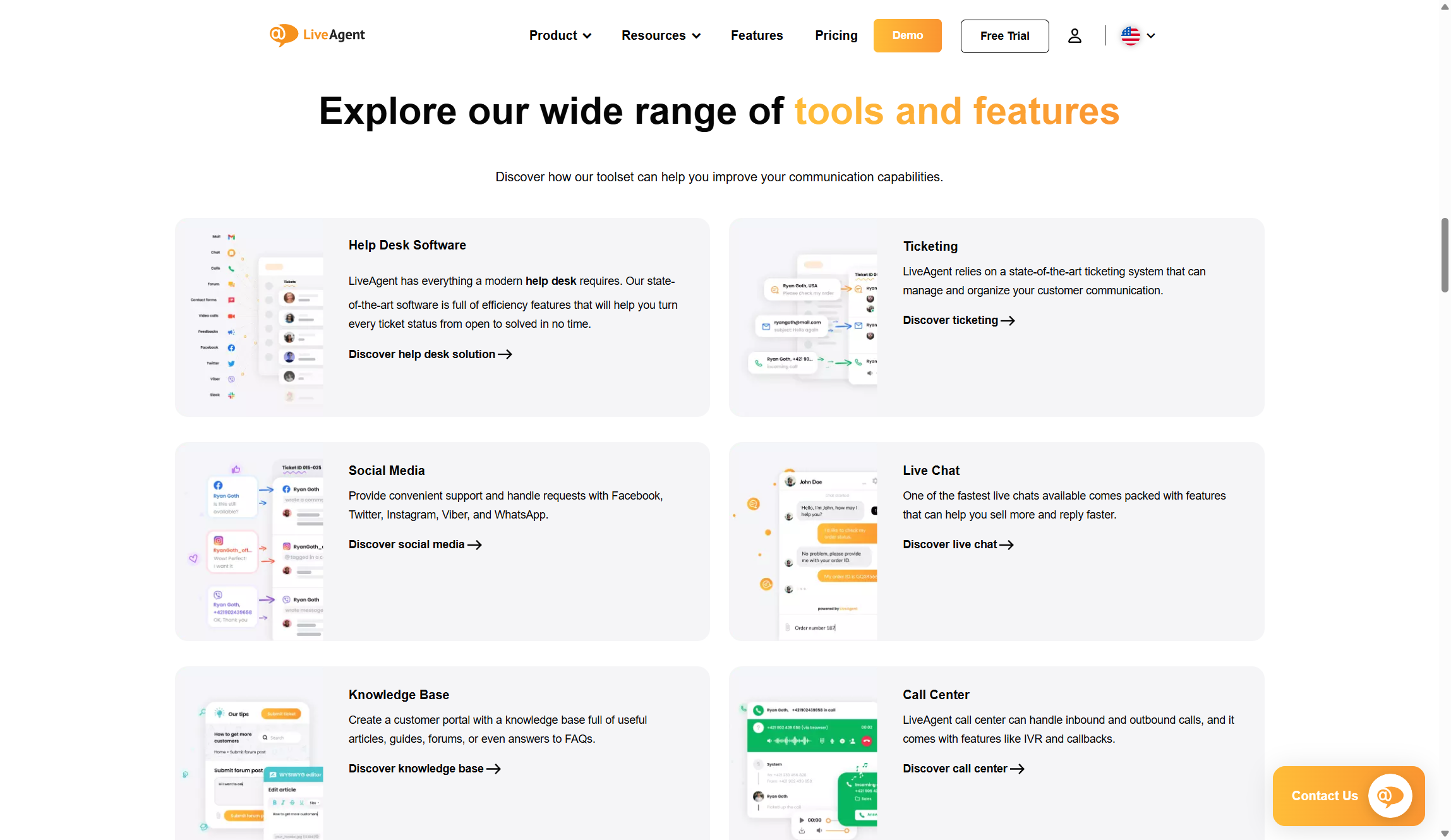
LiveAgent: Features
LiveAgent is a complete customer service platform. It offers many features that improve customer support operations. This software combines help desk functions with live chat tools. Businesses can manage customer interactions across multiple channels. From ticketing systems to advanced analytics, LiveAgent gives support teams the tools for efficient, personalized service.
The platform serves businesses of all sizes, from small startups to large enterprises. LiveAgent scales with growing businesses, allowing them to adapt their customer service as they expand. Larger organizations also benefit from its robust, all-in-one solution. By integrating various communication channels into one dashboard, LiveAgent helps support teams handle customer queries effectively. This leads to better customer satisfaction and loyalty.
Omnichannel communication
LiveAgent's omnichannel communication feature lets businesses manage customer interactions across many platforms. These include email, live chat, social media, voice calls, and video calls. This helps customer support teams provide consistent service, no matter the channel. By centralizing all interactions, LiveAgent reduces response times and boosts overall customer satisfaction.
These omnichannel capabilities let businesses meet customers where they feel comfortable. This enhances the customer experience and drives loyalty. Customers appreciate the flexibility of communicating through their preferred channels, which can lead to higher retention rates.
Unified ticketing system
LiveAgent's ticketing system turns customer queries from every support channel into tickets. This helps support teams track, manage, and resolve issues from one place. It offers advanced features like automated ticket distribution, which sends tickets to the right agent or department based on set rules.
By simplifying ticket management, LiveAgent improves response times and resolution rates. This efficiency can boost customer satisfaction scores and increase customer lifetime value. The ticketing system also provides insights into common customer issues, helping businesses find areas to improve their products or services.
Real-time chat and visitor tracking
LiveAgent's real-time chat feature lets businesses engage with website visitors instantly. This provides immediate support and can turn browsers into customers. The platform includes customizable chat widgets, proactive chat invitations, and visitor tracking. These tools help support teams monitor visitor behavior and start conversations at key moments.
The real-time chat feature, along with visitor tracking, can greatly affect conversion rates. By offering timely and personalized support, businesses can guide potential customers through the sales funnel more effectively. Some businesses have seen a 325% increase in paid customer conversion rates within the first month of using LiveAgent, the company claims.
Automation and AI integration
LiveAgent now uses automation and AI to enhance customer service efficiency. The platform includes canned responses, which are pre-written messages for common questions. This saves agents time and ensures consistent communication. Natural Language Processing (NLP) capabilities help teams understand customer inquiries, sentiments, and intents in real-time.
These features allow businesses to handle more customer interactions without losing quality. By automating routine tasks, LiveAgent lets support teams focus on complex issues that need human attention. The increased efficiency can lead to faster resolution times, improved agent productivity, and higher customer satisfaction scores.
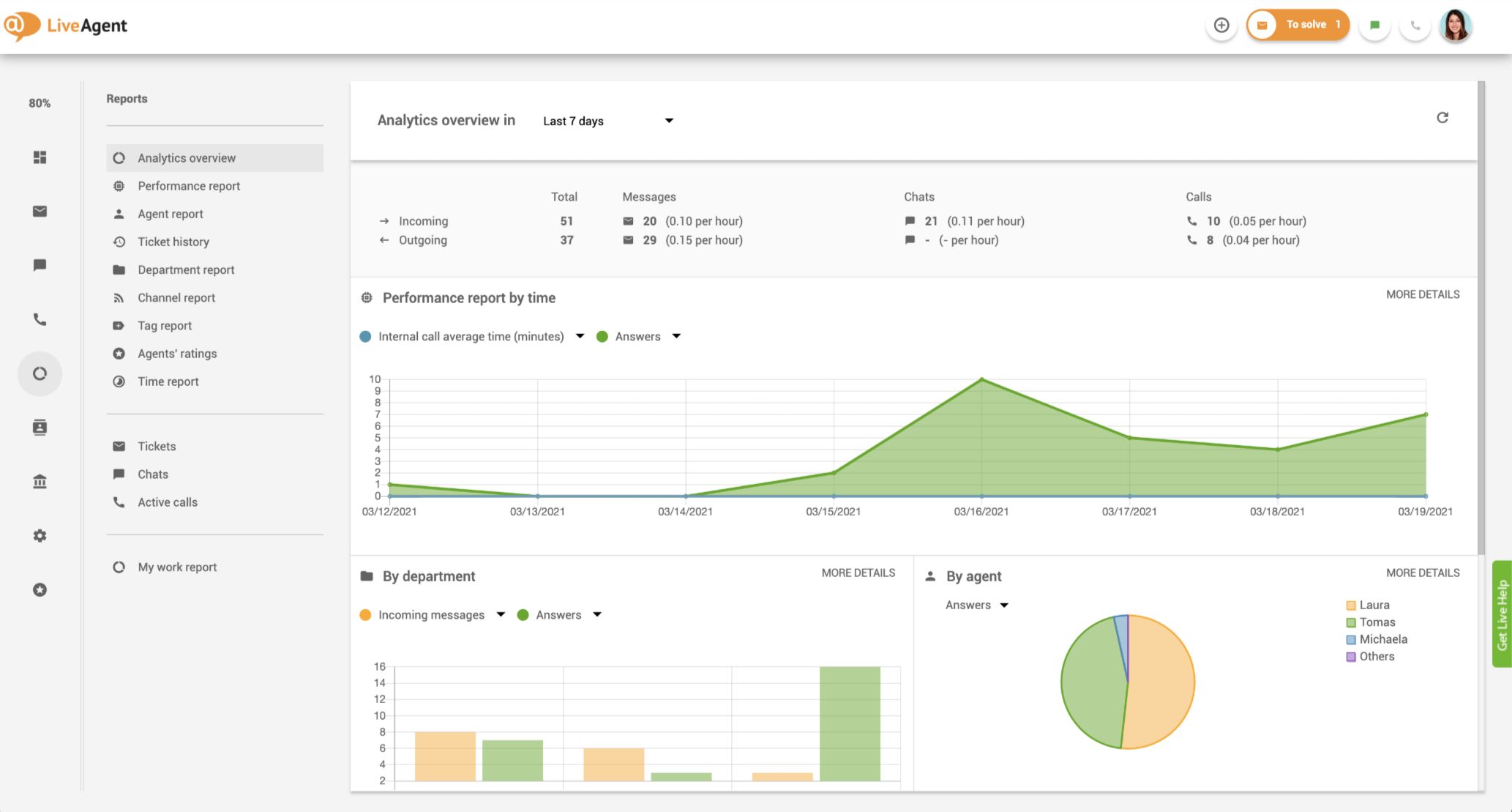
LiveAgent: Analytics
LiveAgent provides a complete set of analytics and reporting tools. These tools help businesses gain insights into their customer service operations. The analytics dashboard offers a quick view of incoming and outgoing messages, chats, and calls. This lets users monitor performance across different channels. With this bird's eye view, businesses can spot trends, measure agent productivity, and make informed decisions to enhance their support strategies.
Then there's the Performance Report. This report shows how the company, departments, or individual agents are performing. It includes metrics like average response times, ticket resolution rates, and customer satisfaction scores. You can filter these reports by time, department, agent, tag, and channel. It helps managers identify top agents, find areas for improvement, and allocate resources effectively within the help desk team.
LiveAgent also provides specialized reports. Tag Reports show the most common customer issues. Channel Reports reveal which communication methods customers prefer. The Agent Ranking overview lists all positive and negative agent reviews, along with customer comments and links to specific tickets. All these features help businesses monitor and improve service quality, leading to increased customer satisfaction and loyalty.
For businesses wanting more advanced analytics, LiveAgent integrates with tools like Zoho Analytics. This integration enables deeper data analysis, including custom report creation, data blending from various sources, and AI-powered insights. With these robust analytics tools, businesses can discover hidden patterns in their data, forecast trends, and make strategic decisions to improve the customer experience.
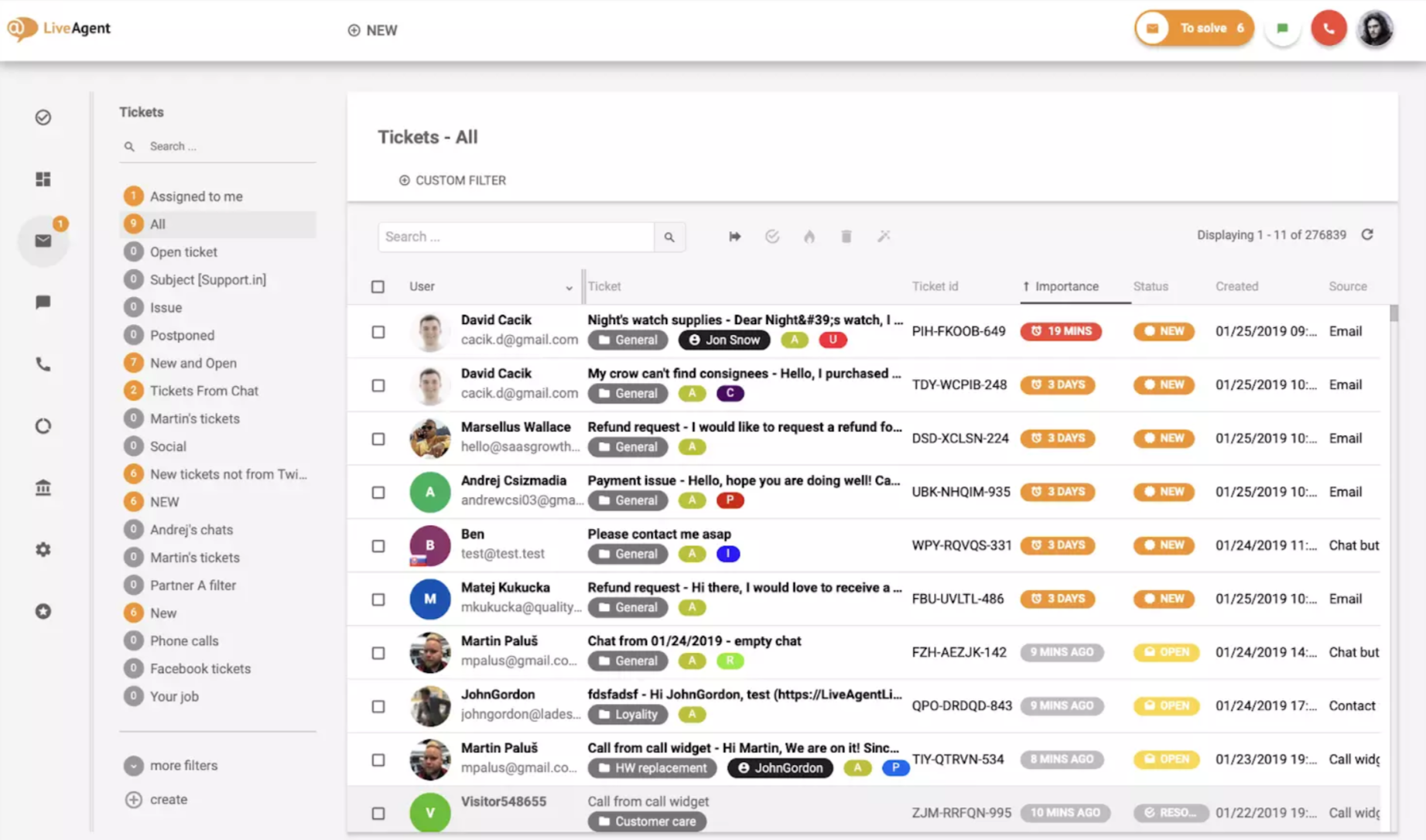
LiveAgent: Ease of use
LiveAgent has a simple interface that lets support teams navigate seamlessly across features. But according to some users, it takes a minimal learning curve when initially setting it up. It features a universal inbox that consolidates all customer messages into one place, enabling agents to easily monitor and respond to inquiries from various channels.
The software is made to be easy to use, but many complain that parts of the interface appear old and require refreshing. People also sometimes have problems with performance, where the system will slow down or freeze, requiring a restart that interrupts work flow for a brief time. But other than these occasional problems, LiveAgent's simple way of managing tickets is generally an improvement for most support teams.
Onboarding is simple and welcoming. Installation times are described as quick, with the system being operational "in minutes." For companies searching for a help desk product that contains lots of features but is easy to use, LiveAgent provides a solid user experience that supports smooth customer service functions.
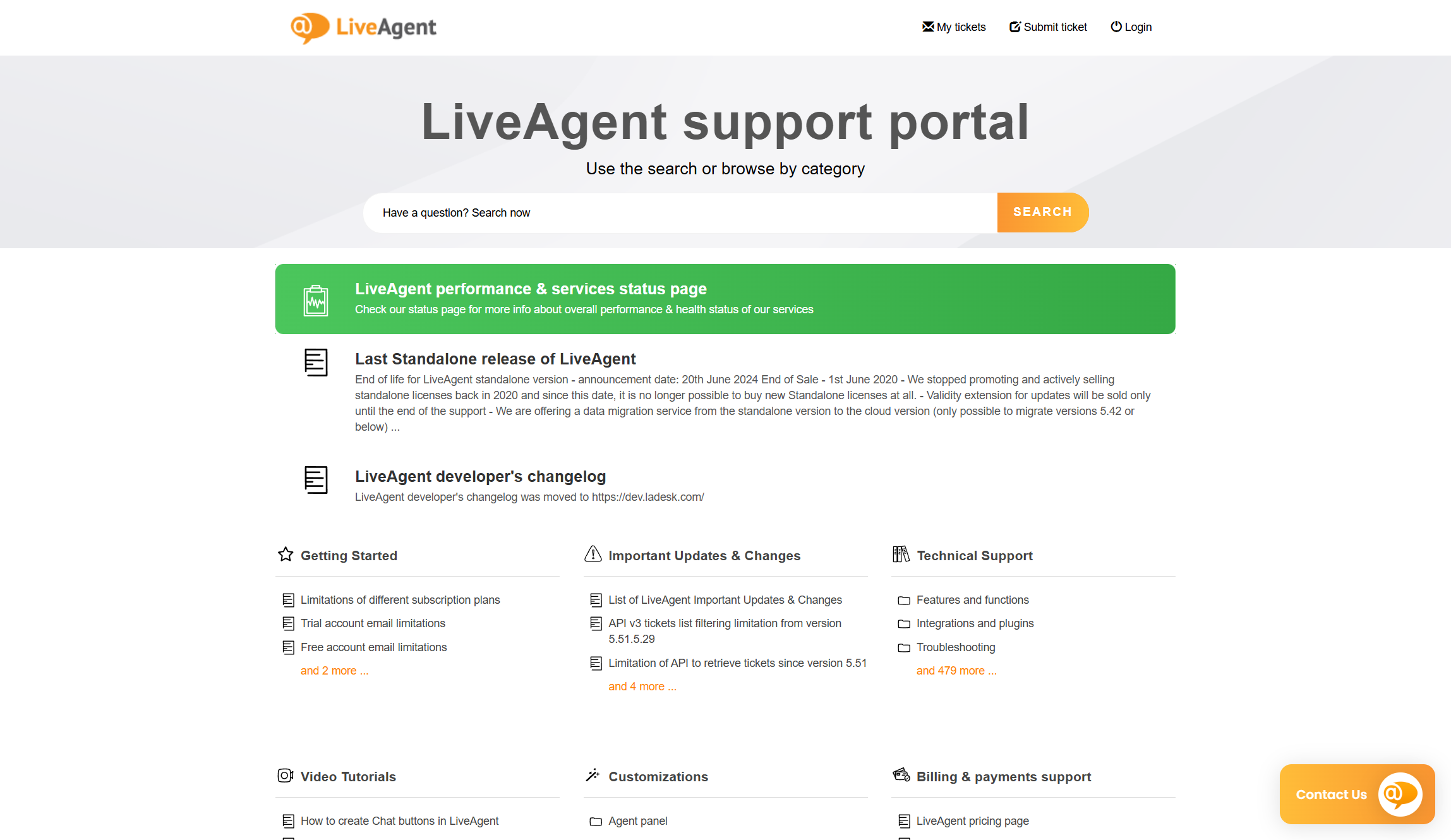
LiveAgent: Support
LiveAgent offers 24/7 technical support by phone, live chat, and email. There's also an extremely comprehensive online support portal.
We were particularly pleased to see a link at the very top of the portal to the new 'live status' page, which reported that unless you were relying on LiveAgent's New Jersey data centers, the network has been functioning perfectly for the past 90 days.
The 'Getting Started' section of the Knowledge Base also has some extremely useful articles, including the one mentioned above about the limitations of paid plans. There's a similar one for users of the free plan as well as a helpful video tour, which walks you through the basics like adding live agents.
The Knowledge Base also contains a dedicated video section with tutorials on common tasks such as adding live chat buttons, departments and email templates. It should be straightforward for you to create aesthetically pleasing knowledge repositories or FAQs for your customers.
You can easily create articles, how-to guides, and other useful information to meet the needs of every customer. Given that many modern customers prefer self-service, the support offered by LiveAgent's Knowledge Base could be exactly the kind of thing being asked for. But self-service doesn't mean offering inferior support. There are still plenty of bespoke options available, from forums to technical product guides.
The 'Tech Support' section is particularly weighty, containing almost 500 articles on subjects like integrating plugins, general tips and tricks, and how to set up various LiveAgent features.
Take some time to peruse the 'Awards and Certificates' section to see how LiveAgent ranks in the help desk solution industry.
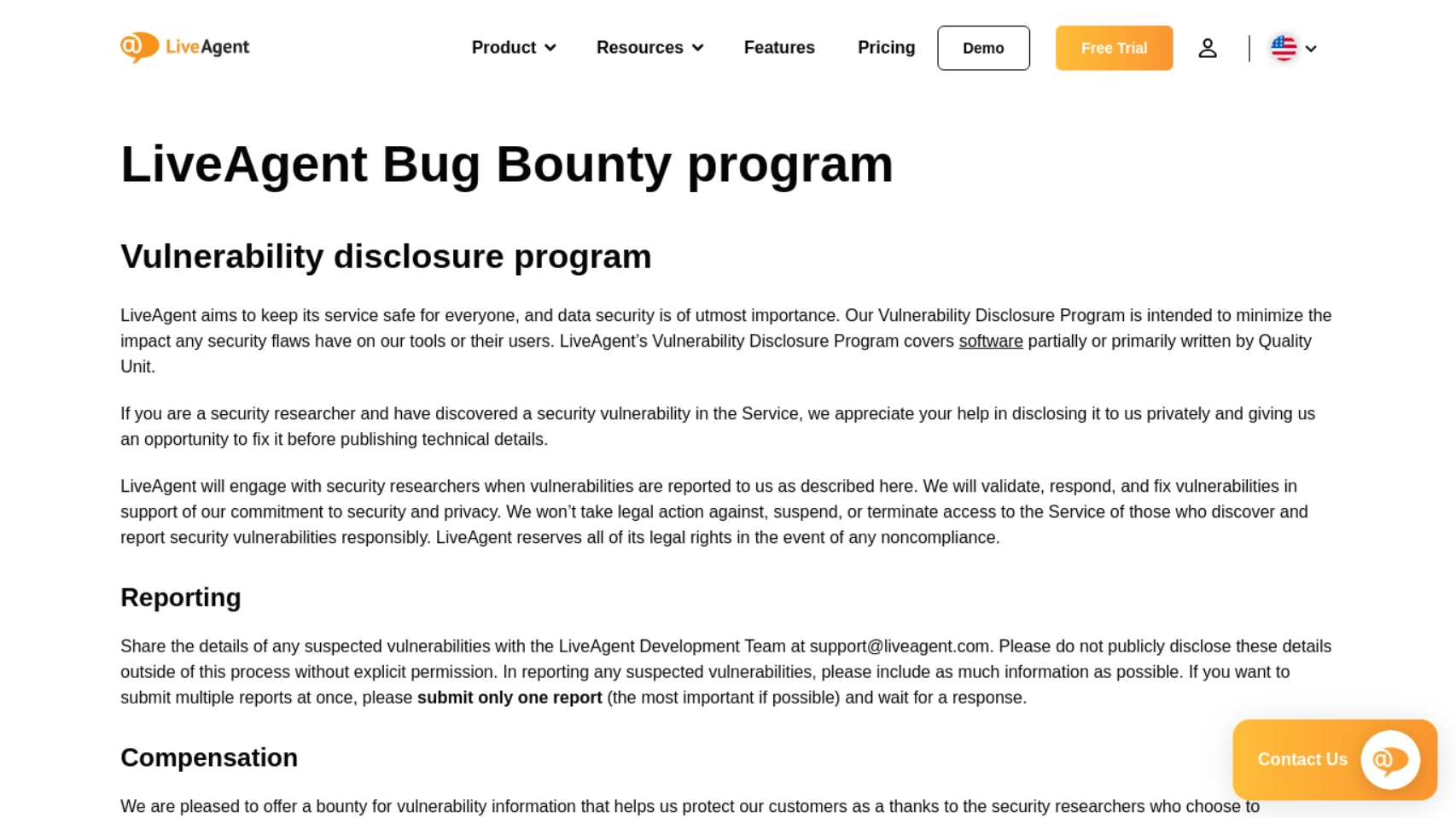
LiveAgent: Security
LiveAgent hasn't been slacking on this end either. The platform claims to use 'renowned' data centers protected by 24-hour surveillance, security cameras, and biometric locks.
All of the company's servers are hosted at Tier IV or III+, PCI DSS, SSAE-16, or ISO 27001-compliant facilities. The data centers are based in US, Asia and Europe - but you can choose to where you wish to store your data for compliance with local regulations.
Their pricing page also mentions that all accounts are secured using SSL to keep your data safe. After probing into the knowledge base, we found that LiveAgent uses TLS 1.2 encryption for all data during transit. Database backups are also fully encrypted when at rest.
Not all information in 'live' databases prioritizes encryption, however. But the company claims that sensitive information like passwords and login credentials is always secured.
LiveAgent's Security and Privacy Policy also notes that you can boost your security by configuring the Agent panel to only allow access from specific IP address ranges such as network addresses at your office site.
On the same page, LiveAgent claims they also work with third-party security researchers to identify vulnerabilities. Customers will have to take them at their word on this and there doesn't seem to be any links to the results of independent audits to prove it.
LiveAgent: The Competition
LiveAgent competes closely with helpdesk services like LiveChat, which focuses primarily on chat but also offers multi-platform messaging support. LiveChat offers prices comparable to LiveAgent’s All-Inclusive plan, from $20 per agent per month if you're paying annually. However, LiveChat doesn’t have a free plan for smaller businesses like LiveAgent does.
LiveChat’s chat functions are somewhat more robust than what LiveAgent offers. For example, it supports chat-to-SMS, customizable post-support surveys, and more advanced real-time monitoring of visitors on your site. However, LiveChat won’t help with phone support and some important administrative features like audit logs are restricted to its Enterprise plan.
LiveAgent: Final Verdict
LiveAgent is high-quality helpdesk software for businesses that want to integrate phone, email, and live chat customer support. The free trial is impressively fitted out for a thorough first-time user experience, while the plans aren’t outrageously expensive. We’d like to see cheaper support for social media accounts and the addition of chat-to-SMS, but these aren’t critical flaws for most businesses.
In addition to everything else, LiveAgent does a nice job with auto-routing tickets across teams and helping your support agents stay on the same page when dealing with an influx of customer requests.
We've also highlighted the best help desk software.

Ritoban Mukherjee is a tech and innovations journalist from West Bengal, India. These days, most of his work revolves around B2B software, such as AI website builders, VoIP platforms, and CRMs, among other things. He has also been published on Tom's Guide, Creative Bloq, IT Pro, Gizmodo, Quartz, and Mental Floss.
You must confirm your public display name before commenting
Please logout and then login again, you will then be prompted to enter your display name.
